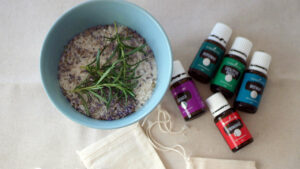“IT SIGNALS the cerebral cortex and sends a message straight into the limbic system, a mysterious, ancient, and intensely emotional section of our brain in which we feel, lust, and invent. Unlike the other senses, smell needs no interpreter. The effect is immediate and undiluted by language, thought, or translation,” wrote Diane Ackerman in A Natural History of the Senses, in describing how the mind interprets a scent.
At the sidelines of a talk in Makati earlier this month by wellness brand Sekaya, we met certified aromatherapist and Alliance of International Aromatherapists member Geri Gil, otherwise known as the Oilbularyo. In her website theoilbularyo.com, Ms. Gil offers up aromatherapy classes as well as a store selling essential oils and other related products, due to her own beliefs about aromatherapy.
Ms. Gil’s journey into aromatherapy began in the early 2000s. A musician by profession, she worked in the advertising industry. In 2008, she was diagnosed with adult asthma, and her children also began exhibiting symptoms of skin asthma. She went under medical treatment including steroids and other drugs, but after three months, her asthma attacks came back. Her doctor told her to undergo a complete lifestyle change, down to changing her diet and even her cleaning products. Later, after her children graduated from school, she even changed her work environment by leaving the advertising world. Disliking the smells of her new cleaning regimen at home, she turned to essential oils.
“It didn’t happen overnight. After seven months, [I said] I haven’t had an asthma attack.”
The Oilbularyo as a business began in 2015.
Ms. Gil distills her beliefs thusly: “We believe in a mind, body, and spirit connection. If your mind is not well, then the other two will not be well. We are in constant ebb and flow. We have to keep that balance,” she said. “Aromas heal. On top of the chemical constituents, the sense of smell is there for our survival. It helps us regulate our well-being and how we connect with each other”
“That came to the fore when a lot of people lost their sense of smell during the pandemic — they cannot smell the persons that they love,” she pointed out. One of the symptoms of a COVID-19 infection is the loss of smell and taste.
Ms. Gil agrees with Ms. Ackerman’s text, saying, “Aromas do heal because it is connected with the limbic system, which is right behind the nose. When you inhale an aroma, it’s processed by the brain, and it sets off signals of people, events, places, memories.
“When we inhale certain aromas, the constituents… there, the turpenes in the oils will help calm you there,” she said, adding that stimulant oils (like lemon) will in turn, have stimulating effects. “That’s what aromas do. They can shift you from one mindset to another.”
As a cheat sheet, she says that oils derived from flowers help with beauty (pointing that her facial serum contains chamomile essential oil); herbs are for health purposes; fruit oils uplift you, while oils from trees ground you. Her bag jingling with the sound of oil bottles, she pointed some out: lavender is the “mother of all oils,” and good for “almost everything,” but especially its calming effects. Peppermint is the “oil of bright heart,” and can be used to refresh, cool — and even relieve grief. “I like to connect that also to traditional Chinese medicine and how there’s a direct connection between negative emotion and disease,” she said.
Still, there are of course precautions to aromatherapy. She warns that one should, “Go low and start slow.” That means diluting the oils in neutral carrier oils, and start by applying it to inconspicuous areas like the bottoms of the feet, lest one risk an allergic reaction. “It’s very concentrated, you don’t need a lot… I wouldn’t,” she said of essential oils. Secondly, she advises checking where the plants for the oils come from. “Make sure you know the farms. Make sure that they’re 100% pure, unadulterated, uncut. It’s not in the label. You really have to do a background check with the farms.”
Many of the commercial products we use come with some sort of scent: from dish soap to face cream. Asked if one can get the same effects while perhaps doing the dishes or putting on perfume, she says, “You could. I can’t really speak for a lot of the synthetics, but in theory, aromas do that to you.”
She emphasizes: “It’s not about treating illness, but you want to create wellness every day, so that you are not harboring hate, anger, or sadness. That will really have a direct effect on certain organs in your body.”
Visit theoilbularyo.com for information on classes and to shop for essential oils. —Joseph L. Garcia
